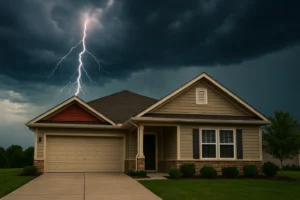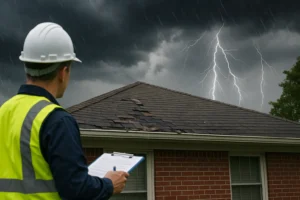“Texas alone averages 132 tornadoes every year.” Imagine that for a moment. Each twister brings the potential for shattered windows, roofs torn off homes, and years of hard-earned possessions scattered like debris. Tornadoes don’t give much warning. They touch down, wreak havoc, and vanish as quickly as they appear. So, it’s important to understand the steps to take if your property is affected by tornado damage.
What Happens to Your Home During a Tornado?
Tornadoes primarily cause damage through high winds and flying debris. Common types of damage include:
- Roof Damage: Tornadoes can rip shingles and even entire sections of a roof off a home, leaving it vulnerable to rain and further deterioration.
- Structural Damage: The frame of a house can be compromised, leading to weakened walls or even complete collapse.
- Window Breakage: High winds and flying debris can shatter windows, leaving the interior exposed to outside elements.
- Water Damage: Once the roof or windows are damaged, water can easily enter the home, causing extensive damage to floors, walls, and furniture.
Tornado Property Damage from Trees
Tornadoes often turn trees into flying projectiles. Whether it’s your neighbor’s tree crashing through your window or your own tree flattening your garage, it’s crucial to know how to deal with this kind of damage. Tornadoes can uproot large trees and send them hurtling into homes, vehicles, or other structures.
If a tree falls and damages your home, take photos, remove the debris (once it’s safe), and start the repair process as soon as possible.
How to Handle Tornado Damage
If a tornado has passed and your home sustained damage, here are some practical steps to take:
- Document the Damage: Take photos and videos of the damage to your property. Ensure you capture both external and internal damage, as this will help with future repairs and assessments.
- Temporary Repairs: If possible, cover broken windows or damaged roofs with tarps to prevent further damage from rain or wind.
- Stay Safe: Avoid entering rooms or areas that seem structurally unsafe. Be cautious of downed power lines, exposed wires, or gas leaks.
Tornado Damage Costs
In tornado-prone areas like Texas, damage repair costs can vary widely. Some common repairs include:
- Roof Repairs: Costs depend on the extent of the damage. Replacing shingles or patching minor damage might be inexpensive, but a completely torn-off roof could run into thousands of dollars.
- Window Repairs: Broken windows need immediate attention to prevent water from entering the home. The cost of window repair or replacement depends on the size and type of window.
- Debris Removal: If trees or other debris have fallen on your property, hiring professionals to clear them can be an added expense.
Tornado Preparedness: What You Can Do Today

You can’t stop a tornado, but you can prepare for one. Here are a few tips to help you minimize damage and stay safe:
- Create an Emergency Kit: Include essentials like water, non-perishable food, flashlights, batteries, and first-aid supplies.
- Designate a Safe Space: Identify a room in your home—like a basement or interior bathroom—where you can take cover during a tornado.
- Secure Outdoor Items: Before a storm hits, bring in or secure loose items like lawn furniture, which can become dangerous projectiles in high winds.
- Stay Informed: Sign up for weather alerts and be aware of local tornado warning systems.
What to Do After a Tornado Hits
Once the storm passes, safety should be your first priority. Here’s what to do next:
- Check for Injuries: Attend to any medical needs first.
- Inspect Your Home: Only do this if it’s safe. Look for structural damage, exposed wires, and other hazards.
- Avoid Downed Power Lines: Stay far away from fallen lines and report them to local authorities.
Tornado-Proofing Your Home
While no home is completely tornado-proof, taking proactive steps can help reduce the damage from severe storms. Consider:
- Storm-Resistant Features: Reinforcing windows, doors, and roofs can help reduce the damage from high winds. Installing storm shutters or impact-resistant windows can also protect your home.
- Storm Shelters: If you live in a tornado-prone area, consider installing a storm shelter or safe room for added protection during severe weather.
Frequently Asked Questions (FAQs)
First, ensure everyone’s safety. Then document the damage, make temporary repairs if possible, and start the process of assessing and fixing the damage.
Tornadoes typically cause damage through high winds and debris. Common types of damage include roof damage, broken windows, and structural damage.
Create an emergency plan, secure outdoor items, and consider reinforcing key parts of your home like windows and doors.






